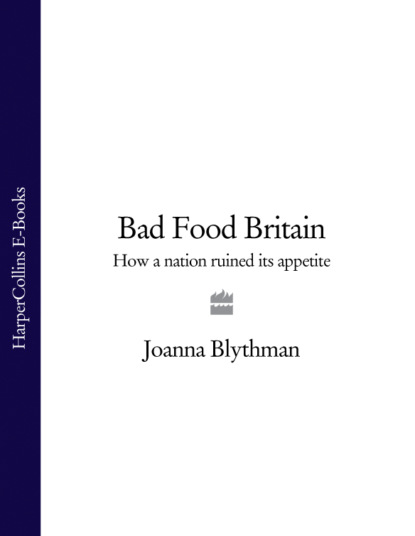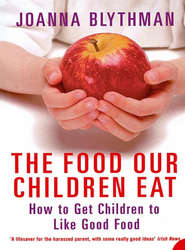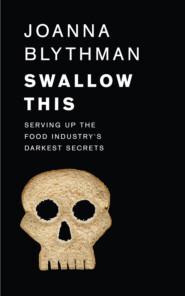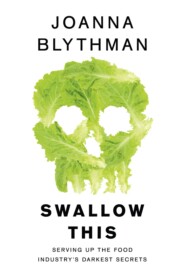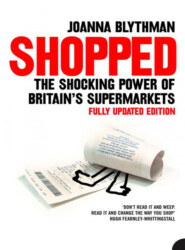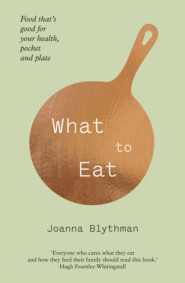По всем вопросам обращайтесь на: info@litportal.ru
(©) 2003-2024.
✖
Bad Food Britain: How A Nation Ruined Its Appetite
Настройки чтения
Размер шрифта
Высота строк
Поля
And that’s just for starters!
This book explores all the contemporary manifestations of Britain’s unhappy relationship with food; the embedded ideas, patterns and practices that keep us locked in a Bad Food mindset and which feed the nation’s profound gastronomic illiteracy. Not the least of our current troubles is our inability to admit that something is wrong. Like an alcoholic who can’t accept that he or she has a drink problem, Britain is in denial that it has a Bad Food problem. Yet such an acceptance is a necessary preliminary to identifying creative solutions that might enable us to appreciate the pleasure we might derive from better food, and in the process transform the quality of our life.
Bad Food Britain is not a history book, although the roots of Britain’s current difficulties with food would richly reward such an approach. Perhaps the weak food culture in Britain is due to early industrialization, and a consequent rapid growth of an urbanized population divorced from the countryside and food production? Religion may play its part in the form of a Protestant work ethic which spawned a breed that would rather build an empire or factory than waste hours preparing and eating food; a peculiarly Anglo-Saxon form of Puritanism which holds that it is immoral to enjoy or cherish food too much, parsimony and abstinence being the higher goals. Other factors might include our grey northern climate, the legacy of post-war rationing, our close identification with the United States and ‘time is money’ American capitalism. Or might it be a matter of simple xenophobia, complicated by a fine overlay of class; the notion that food is something fancy that only foreigners, or those who ape them, enjoy? Whatever the historical explanation, the fact remains that food never has been a British priority and shows no signs of becoming one in the near future.
One of the most amusing but telling insights I happened on in the course of writing this book was the following letter, published in The Times during the wave of concern that flowed through Britain in the wake of the transmission of Jamie’s School Dinners:
Sir,
A letter from my daughter’s primary school in Essex reads:
Change to the School Menu
In response to recent publicity, ‘Turkey Twizzlers’ have been taken off the school menu and replaced by ‘Chicken Teddies’.
What is it about the British and food? We just don’t get it, do we? Well, it’s time that we did.
BAD FOOD BRITAIN IN NUMBERS (#ulink_78ab4834-5711-5ad6-9255-6a5c731d45bb)
BRITAIN’S TOP 10 BAD FOOD BELIEFS (#ulink_189863f2-3bc1-5fef-957f-a7f722b4b4f7)
* Eating is about refuelling, not pleasure. A part of life’s routine, just like going to the lavatory.
* Home cooking takes too long. Successful Britons buy ready-made food instead.
* Food is not important. Pretty much everything else in life matters more.
* A dining table is a redundant item of furniture.
* The single most important thing to know about food is what it costs.
* There is no point in giving children good food. They won’t appreciate it.
* There is no such thing as bad foods, only bad diets.
* British supermarkets stock such great food, there is no need to shop elsewhere.
* You can live on a diet of processed food and still stay healthy and slim.
* A microwave is the only piece of kitchen equipment you really need.
1 FANTASY FOOD (#ulink_35cc51f2-2359-5cd1-ab81-5df1d6466225)
Britain lives in a fantasy food world, a virtual food state. Our shelves are laden with cookbooks. Books about eating or cooking are never out of the bestsellers lists. In 2005, cookbooks – already one of the book trade’s richest earners – reached new money-spinning heights. Sales of food and drink books grew by 22 per cent, (#litres_trial_promo) while fiction grew by only 5 per cent. Our television schedules are studded with programmes about food: Ready, Steady, Cook, Full on Food, You Are What You Eat, Jamie’s this, Gordon’s that, Nigella’s this, that or the other … there is no avoiding them. Newspapers and magazines spew out a diet of recipes, discussions of ingredients, restaurant and cookery book reviews. The number of column inches and amount of air time given to food in Britain dwarfs that in every other comparable country. According to Vogue magazine: ‘How we cook, what we cook with, where we last ate, what our children are eating … is an obsession (#litres_trial_promo) that has stretched its sticky, lickable hands across society.’
The pages of weekend supplements are populated by beautiful people plucked from a nation of lip-licking gastronomes, a nation that grows food, cooks food and rejoices in the eating of it. They live in lofts and stylish townhouses, or – depending on the newspaper’s readership profile – in covetable country houses and holly-hocked cottages. Wherever they are located, these people are ultra-literate in food and gastronomy. They take a great interest in foodie arcana, soaking up articles on items such as shade-grown peppercorns and salted, sundried Sardinian tuna roe, like children devouring the latest Harry Potter book. They weigh up the pros and cons of Lacanche ranges versus Agas. It matters to them that their crème brulée is correctly caramelized, so they give each other blow torches as Christmas presents. They are endlessly fascinated with the contents of famous people’s refrigerators. Their own capacious American-style, double-door fridges are filled with organic goat’s milk yogurt, juice squeezed from English heritage apples and Toulouse sausages made from rare breed, acorn-fed porkers. They savour obscure cocktails dreamed up by someone purporting to be the world’s most innovative mixologist. Their shelves are stacked with at least six different estate-bottled extra virgin olive oils. Their drawers are filled with expensive Japanese knives as recommended by Bad Boy chef, Anthony Bourdain. These people constantly give dinner parties or, more fashionable these days, informal, relaxed ‘suppers’ for foodie friends. They are tuned into every little nuance of food provenance, seeking out products of impeccable pedigree as they navigate their way around farmers’ markets, specialist food shops and mail order companies supplying everything from samphire to smoked eel. When you see the picture of them sitting around their craft-made dinner table, hewn from a vast trunk of fallen oak or elm by a local architect who downshifted to the country, they are surrounded either by adorable, food-appreciating offspring weaned on puréed allotment parsnips, or by stimulating food enthusiast guests. Attentive readers of Heat or Hello! magazines may even be able to spot the odd celebrity peeping out from their assembled ranks.
And you know what? They don’t exist. Correction – they account for a vanishingly small percentage of the British population. Anyone from abroad who skims through these supplements or switches on UK television could be forgiven for gaining the impression that Britain is a country that celebrates matters alimentary, one that devotes huge swathes of its waking time to living and breathing food. In fact this is merely a construction of how the British like to see themselves, as a switched-on, fully-participatory food culture. Our diligently prepared diet of ‘what to eat, where to buy it’ foodie lifestyle is engineered and highly accomplished, but the edifice is all the more audacious because of the scale of the lie it sells. Welcome to the peculiarly British world of food pornography, where watching other people cooking food or talking about cooking food has become a substitute for doing it yourself. Chef Simon Hopkinson (#litres_trial_promo) put his finger on it when he wrote:
‘Something seems to be ever so slightly rotten in the state of the British kitchen just now. I sometimes feel that we have all but lost the grasp of how to cook nicely at all. We watch endless cookery programmes, but prefer, finally, to spend lots of money on supermarket ready-meals while idly turning the pages of spotlessly clean cookery books until the microwave pings.’
The more media space food and cooking occupies in Britain, the less it reflects any grass roots practical activity. We have become a nation of food voyeurs. The broadcaster Jeremy Paxman (#litres_trial_promo) provided an explanation for this apparent contradiction when asked if he was interested at all in food. ‘Well, I would be if I had more time, but it’s one of those things that’s gone to the wall as life has got busier,’ he explained. ‘I might read a recipe and think “That sounds absolutely delicious”, or “That seems an interesting idea”. So I tear out the page but never make the recipe.’ Mr Paxman speaks for the nation in this respect. It has a theoretical interest in cooking and earnestly means to get around to doing it at some point. But when time is at a premium and there is too much to do, then cooking, being an optional extra as opposed to a core British activity, is the first thing that must go. And yet the British continue to turn out one glossy cookbook after another. As the Evening Standard’s Literary Editor, David Sexton, (#litres_trial_promo) observed, their marketability is more to do with the generous dollop of lifestyle with which they are garnished, than the recipes. ‘Such incessant activity is only achieved, of course, by emphasizing everything but the food … We are sold instead the personality of the cook, the romance of the foreign journey, the superior lifestyle that somehow the food is supposed to supply. Recipes become almost irrelevant. Now the cookbook is not a manual at all but rather an aberrant species of literary composition, one of the most baroque products of the age.’
Britain has now built a lovingly-assembled, reassuring image of itself as a country that has undergone a second coming on the food front, but unfortunately this is not predicated on any day to day reality. Quite the opposite. We have become detached from reality by persuading ourselves that the frequency of practical cooking is no longer the most telling indicator of a country’s culinary health. Just as agony aunts will advise that in their experience, infrequent sex is often a sign of a relationship in terminal decline, Britain’s reluctance to cook suggests that all is not well in its relationship with food. But the British are in denial. Rather than face this unpalatable truth and do something about it, we have preferred to buy into the myth that a diet of well-chosen ‘tried and tested’ processed meals and savvy eating out is a viable substitute for hands-on cooking.
The last time significant sections of the British population actually showed any signs of seriously improving their cooking skills, and hence the quality of the food they ate, was in the heyday of Delia Smith. Delia caught the BBC’s eye at the end of the 1960s with cookery columns in the Daily Mirror, the Evening Standard and the Radio Times. Her television career began in 1973 with the BBC series Family Fare, a title which now would be dismissed out of hand by commissioning editors because of its in-built assumption that viewers might be interested in cooking family meals.
Family Fare proved so popular, however, that after running for two years, it was followed in 1975 by the mega-series Delia’s Cookery Course. The aim of this major series, which was broadcast repeatedly over more than a decade, was systematically to take viewers through the basics of cooking and teach fundamental techniques to home cooks. The goal was unashamedly educational – Delia’s series came under the auspices of the BBC’s education programming – and what she taught on screen was backed up by affordable paperback manuals filled with easy-to-follow, well-tested recipes which, if instructions were followed, would guarantee sound results. It became the model for other influential series in the same education slot: Madhur Jaffrey’s Indian Cookery in 1982 and Ken Hom’s Chinese Cookery in 1984. These presenters all shared the same neutrally pleasant but essentially functional approach: We are here to teach a practical skill. You are watching because you want to learn so that you can try it out.
Delia’s style of presentation was that of an ever so slightly glamorous domestic science teacher: encouraging, straightforward, business-like and not at all show-offy. She assumed the traditional female cookery demonstrator’s pose, face on to the camera, standing behind a worktop covered with basic kitchen equipment and a small sea of glass bowls, and she took viewers through a few recipes with thoroughness and detail, flagging up possible variations on the theme. She communicated her knowledge of cookery in a factual way, taking nothing for granted, stopping regularly to explain or introduce a new ingredient or the usage of a less common item of kitchen equipment. Her attitude was not a patronizing ‘Poor you, haven’t you heard of balsamic vinegar? Oh do keep up!’ but an unthreatening ‘Here’s an interesting Italian vinegar that I like and I think you might like too’. Delia came over more like an approachable member of the local Women’s Institute than a scion of some elite society of food connoisseurs. She did not fit the mould of the distinguished, upper-class, English cookery writers, such as the wonderfully acerbic memsahib Elizabeth David, or the erudite, well-travelled Jane Grigson. They had performed a stalwart service by helping to drag British food out of its post-war austerity, but they influenced a select audience of people rather like themselves. Whether or not she consciously set out to do so, Delia Smith became a food democrat whose mission was to broaden the food knowledge and cooking capability of the great mass of ordinary Britons. As such she developed a strongly female following who found her recipes realistic and do-able.
Out there in Middle Britain, the Delia effect was tangible. In the 1980s and early 1990s, it was always a great relief when visiting family, friends and acquaintances with a less than impressive record on the cooking front to hear the phrase ‘I didn’t know what to make so I just made a dish from Delia Smith’. That usually ominous introduction from the nervous, unconfident cook ‘I’ve never made this before … I hope it’s all right’ was instantly less perturbing when followed up with ‘… It’s a Delia recipe’.
By the late 1990s, the Delia brand increasingly became seen as old-fashioned, a bit plodding, in need of lightening up, and out of touch because of its patronage of the unglamorous, primarily female realm of home cooking. Delia had been upstaged by a new generation of TV cooks who fitted in with broadcasters’ notions that food now belonged not in an education, but light entertainment slot. Keith Floyd was the vanguard for this new genre of TV food entertainment. His recipes were rough and inexact, unlike Delia’s meticulously weighed centilitres and grams. An ageing, rakish bon viveur with a diverting line in banter, he appealed to male viewers, to the kind of man who likes to show off his cooking skills at high-profile events but doesn’t like to muck in with everyday domestic cooking. The efficacy of Keith Floyd’s recipes was considered by broadcasters to be secondary to his entertainment value. They liked him because he rescued cookery from what they considered to be a female ghetto. He got out of the studio and cooked up impromptu feasts on boats, in fields, on beaches. He supplied excitement and added value. He did something more than just cook.
Keith Floyd provided a prototype for a new breed of TV cook or ‘celebrity chef’. It was no longer good enough merely to teach people to cook. Celebrity chefs had to offer the viewing public something different, because – and here’s the irony – they now had to appeal to people with little or no interest in food, people who quite possibly had no intention to cook. Consequently, Jennifer Paterson and Clarissa Dickson-Wright were not allowed to be just two patrician, middle-aged women with a formidable knowledge of food, but had to be portrayed as PG Wodehouse stereotypes, Two Fat Ladies travelling around, Biggies-style, with a motorbike and side car. The gimmicks abounded. Jamie Oliver had to keep up a constant stream of chippy barrow-boy prattle and slide down banisters to boost ratings figures amongst younger viewers. Nigella Lawson had to look eternally gorgeous and seductive and spout a script heavily overlaid with sexual nuance. These added-value cookery shows demonstrated, yet again, Britain’s traditional lack of conviction that food in its own right merits intelligent interest. The underlying thinking was that cooking is a chore which, in its unadorned form, could not be expected to appeal to British people. It had to be spiced up with a series of innovations if ratings were not to flag. Food and cooking needed something else to sell it: sex, travel, eccentricity, adventure, farce, incessant swearing – anything.
The success of these new-wave food programmes created a mass delusion, the idea that British people were already so sophisticated in their appreciation of good food, and accomplished in the cooking of it, that they had no more elementary lessons to learn. In 1998, Delia Smith had launched a new series, Delia’s How To Cook, a back-to-basics cooking primer aimed at reintroducing Britons living on processed food to the pleasures of cooking. This was blatantly at odds with the assertion that Britain was in the throes of a good food revolution and provoked an outburst from chef Gary Rhodes (#litres_trial_promo) who attacked How To Cook as ‘Offensive’. ‘I don’t need to be shown what boiling water looks like and I tend to think that the rest of the population don’t need to be shown it now,’ he said. ‘It is insulting to their intelligence.’ Soon after, chef Antony Worrall Thompson (#litres_trial_promo) jumped on the anti-Delia bandwagon dubbing her ‘the Volvo of cooking’ because he considered that she was reliable but dull.
Delia Smith (#litres_trial_promo) retaliated, voicing her aversion to celebrity chefs and the whole ‘food as light entertainment’ approach, laying into BBC2’s prime-time popular food show in particular. ‘I will never, ever know, as long as I live, how the BBC or the general public can tolerate Food and Drink,’ she said. Food and Drink was the progenitor of a new strand of live audience programmes in the game show mould. It was made to be undemanding and unintimidating, so presenters who actually knew anything about their subject had to pretend that they were just punters. Those who knew no more than the average citizen were awarded the status of idiot savants and charged with talking garrulously and hyperactively, so reinforcing the British suspicion that anyone who goes on about food is either mad, irrevocably pretentious or downright ridiculous. It was geared to viewers with the attention span of a flea.
Then, in 2003, after selling ten million books, Delia Smith announced her retirement (#litres_trial_promo) from cookery. She said that she was ‘reciped out’, but fired one last salvo at the massed ranks of celebrity chefs before she went. ‘What’s happened to the amateur cook in the country house? Or that lady down the pub who only the locals knew about and cooked up a storm?’ she asked. Delia’s retirement marked the consignment of any serious attempt to teach Britain practical cooking skills to the dustbin.
The balance of culinary power in Britain has now swung away from the domestic zone, where its keepers were women who passed on their accumulated knowledge with their egos held well in check, to the male zone, where its new luminaries are a bunch of flashy performance artists. The success of these performers is not measured by whether the woman along the road successfully cooked one of their dishes, but by their ratings and book sales.
The focus of food fashion has become more rarefied, arcane and preoccupied with the endless pursuit of novelty; in fact, it is entirely detached from most Britons’ domestic cooking experience. A lot of media attention has been given to Heston Blumenthal, chef of the Fat Duck at Bray and his particular style of cooking – ‘molecular gastronomy’. Mr Blumenthal’s gastronomy is complex, and is best contemplated only by the most seriously skilled chefs, yet his recipes turn up with regularity in programmes and magazines aimed at ordinary people, most of whom seem impressed. Writing in the Evening Standard, Yasmin Alibhai-Brown (#litres_trial_promo) declared herself to be perplexed by the whole Blumenthal phenomenon: ‘I watched him on TV last week making mashed potatoes – twelve steps, one and a half hours, eight different pots and utensils and an end result that looked like thick soup. Is he taking the mickey?’
Food as a spectator sport has now become a huge industry in Britain. In countries that are feted for their cuisine, such as Italy and France, food has a much lower profile in the media. Weekend newspapers carry a restaurant review, perhaps a profile of a chef, a diary of local food and wine festivals, and the odd recipe. News-stands sell a number of cheap, practical magazines filled with seasonal recipes for everyday cooking. Commonly these recipes are not authored, since the object of the exercise is to show what the dishes look like and explain how to make them, not sell the lifestyle of food celebrities. When chefs appear on French and Italian television, viewers do not get a through-the-keyhole snoop into their lives to see their children, homes or long-suffering partners. They simply stand up, demonstrate a recipe and leave it at that. If you talk about ‘celebrity chefs’, Europeans look blank and are not sure what you mean.
The justification advanced for the Great British Media Food Circus with its clowns, acrobats and survival artists is that it has helped Britain catch up with established food cultures and rekindled the flame of British gastronomy. Jamie is turning on young people to cooking by making it seem trendy and youthful. Gordon is drumming up recruits for the catering profession by reducing B-list celebrities to tears in front of the camera. Paul and Brian are supplying stressed-out housewives with barnstorming 15-minute menus using hideously incompatible and unfamiliar ingredients that will invigorate their lacklustre cooking. The only problem with this noisy and ever more attention-seeking circus is that it has had the opposite effect. As the food writer Tamasin Day-Lewis (#litres_trial_promo) has commented: ‘What strikes me is the number of perfectly competent cooks who say they have become frightened of cooking. They feel that what they once cooked with confidence is no longer fashionable. Restaurant and television food has added to their insecurity.’ A case in point is comedienne Arabella Weir, (#litres_trial_promo) who confesses: ‘All that plethora of cookery shows really does is make me feel insecure. They don’t make me think, “Oh what a great thing to do with scallops and chives.” I just think, “Oh God! I’m just a fat oaf who lives in a horrible kitchen!’”
As far as the media is concerned, food and cooking in Britain should be viewed similarly to advertising. Its job is to sell us an aspirational lifestyle in which food occupies its time-honoured place in British society as a way of defining class, status and refinement. But, like parading a line of skinny supermodels before a local Weightwatchers group, its effect is not empowering but paralysing. The people who are apparently showing us how to cook are asking too much of us. They offer a menu of incessant choice, seasoned with a perpetual stream of possibility. But they are not like us, they do not represent us, and we can never be like them. They live in a world glossy with food fashion, rich with knowledge and busy with perpetual novelty. We watch them, talk about them, and let ourselves be entertained by their antics as a form of diversion and escapism, but we know that all this has little or nothing to do with real life.
2 HOW OTHERS SEE US (#ulink_201d5f79-b463-532d-aa7b-e2f1bd61d63b)
Just days before the 2005 G8 Summit meeting at Gleneagles in Scotland, French President Jacques Chirac put his diplomatic foot in it. At a high-level meeting in Russia to celebrate the 750th anniversary of the founding of Kaliningrad, (#litres_trial_promo) and in earshot of reporters from the French daily newspaper, Libération, President Chirac entertained the Russian President Vladimir Putin and German Chancellor Gerhard Schroeder by mocking British food. ‘We can’t trust people who have such bad food,’ (#litres_trial_promo) he was quoted as saying, compounding the insult with, ‘the only thing they [the British] have ever done for European agriculture is mad cow.’ President Putin and Chancellor Schroeder seemed to appreciate his humour, laughing and joining in with the banter.
Britain, on the other hand, was not at all amused. Rather than brushing it off as might a country confident about its food culture, and cuisine, the UK rose to the bait – big time. ‘Don’t talk crepe, Jacques!’ (#litres_trial_promo) bellowed the Sun.‘How would Mr Chirac feel (#litres_trial_promo) if others descended to this level of argument and called him a snob and a has-been who pongs of garlic?’ asked the Daily Telegraph.Egon Ronay, (#litres_trial_promo) publisher of the eponymous restaurant guide, accused the French President of being ill-informed. ‘A man full of bile is not fit to pronounce on food. There’s no other country in the world whose food has improved so greatly and more quickly in the last 15–20 years than this country,’ he said. In the Evening Standard, Fay Maschler, (#litres_trial_promo) doyenne of British restaurant critics, denounced President Chirac’s ‘ignorant, witless remarks’, retaliating with a tirade against French food:
‘The simple little restaurant run by maman and papa straight off the pages of Elizabeth David’s French Provincial Cooking, where a carefully composed meal made from local produce was sold for a song, exists no more. Or at least it needs a Sherlock Holmes detective to find. Menus in various departments of France are repetitive and monotonous … Restauration in its homeland (France) has become a depressed and cynical exercise … Even getting a good cup of coffee and a noble loaf of bread is nowadays easier in London than in Paris.’
The rivalry between the French and the British is historic. France and Britain have been best of enemies for centuries. Cross-Channel insults are nothing new, and the French President’s remarks were bound to provoke a certain amount of retaliatory flag-waving and chauvinism. Back in 1999, a light-hearted article published in the New York Times in which the critic William Grimes (#litres_trial_promo) said that Cornwall ‘probably offers more (#litres_trial_promo) bad food per square mile than anywhere else in the civilized world’ and likened the Cornish pasty to a doorstop, actually provoked one pasty maker into burning an American flag in protest.
But the strength and stridency of the reaction to President Chirac’s comments demonstrated that he had wounded our national pride in a fundamental way. But why such vulnerability? The French President had exposed our long-standing Achilles heel. However much commentators try to promote a rehabilitated image of British food with inspiring tales of booming farmers’ markets, new-wave artisan producers and innovative restaurants, the unpalatable fact is that other nationalities either just don’t buy it or, at best, they judge any improvement to be minimal. For instance, in 2001 the New Yorker magazine talked of ‘the baby steps the British are taking away from their tradition of gruesomely bad cooking’.
The United States enjoys being rude about Britain’s food. Thinking Americans feel embarrassed about their own fast-food diet which is universally hailed as unhealthy and obesogenic. Britain gives them a country to which they can feel superior, one with worse food than their own. Even high-profile ambassadors for Britain’s revitalized food culture such as Jamie Oliver can’t escape the sneers and curled lips. Mr Oliver complains that when he travels abroad, he frequently ends up listening to people bad-mouthing British food. ‘You go on Jay Leno (#litres_trial_promo) [a US talk show] for the third time and he’s still making cracks about shitty English food.’ The British take it particularly badly when Americans criticize our food. It feels like a best friend swapping sides and ganging up with the enemy – that’s France, Italy and any other country that outshines us on the gastronomic front.
Britain becomes tetchy very easily when negative comparisons are made with countries that have thriving food cultures, using attack as a form of self-defence. This sideswipe at Italian food, from the Daily Telegraph’s restaurant critic, Jan Moir, (#litres_trial_promo) is a classic example. She took exception to chef Antonio Carluccio pointing out that Italian labourers eat truffles – an illustration of how good food in Italy is regarded as a democratic entitlement, enjoyed by all social classes.





